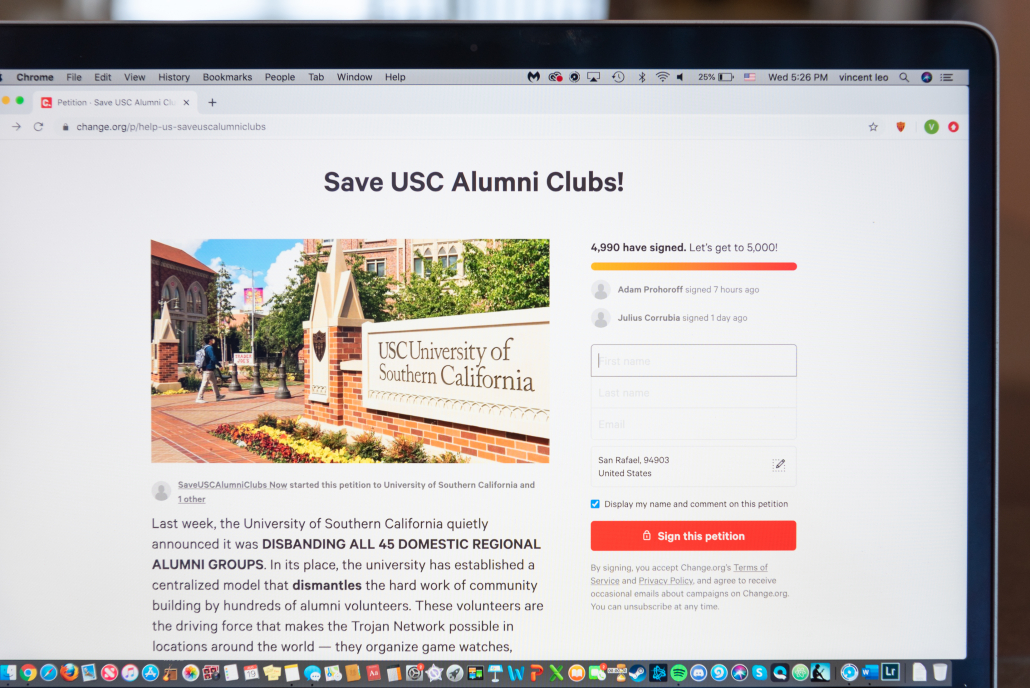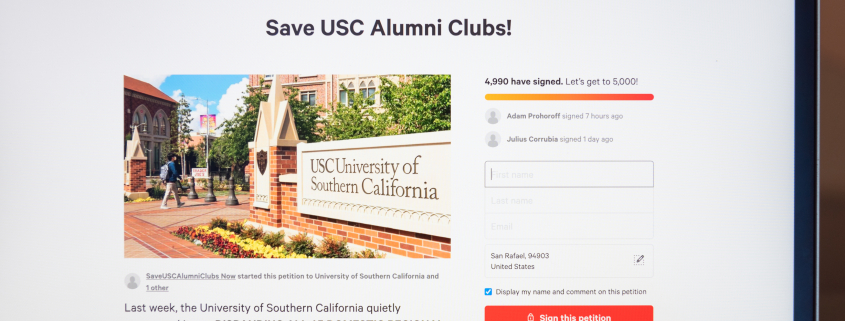Alumni Association restructuring brings discontent to members from the lack of transparency

The USC Alumni Association redistributed its regional and staff resources over the summer to provide three program types with the goal of improving alumni engagement.
The “Trojan Traditions” represents longstanding events such as the Summer SCendoff and Football Game Watch Parties while the “Trojan Exemplars” will offer professional and career opportunities through industry expert panels as well as the “Trojan Network,” USC’s online alumni networking and mentoring platform. “Trojan Locals” will consist of social events in localized areas, such as USC Night at the Hollywood Bowl in Los Angeles.
This new model of alumni engagement, launched July 1, established regional advisory groups in San Diego, Orange County, Los Angeles, San Francisco and New York and dismantled the previous alumni club leadership structure. According to a Q&A recap of a June 3 Town Hall meeting discussing the changes, the association said the new structure is a “program-based and user-friendly strategy.”
Previously, the regional alumni club leaders were in charge of organizing local events, such as football watch parties and coffeehouse meet-ups. With the new changes, the regional leadership boards were disbanded, and alumni volunteers will need to submit an event for approval by their regional staff liaison.
The USCAA said in an email that the decision to disband the regional leadership structure allows any alumnus to organize alumni events, creating a more flexible and inclusive approach to engagement. The group believes the new structure is an improvement upon how the alumni network was previously organized.
Sam Dorn, former president of the Washington D.C. Alumni Club, expressed his discontent with the changes and lack of transparency involved with the development process.
“The reason we are upset is that these changes were implemented unilaterally,” Dorn said. “They didn’t consult with any on-the-ground alumni leaders, which is a management and organizational flaw.”
Despite widespread frustration over the changes, Dorn said alumni across the country want to continue working with USC to maintain the strong network. More than 70 alumni club leaders from New York to Phoenix sent a letter to President Carol Folt July 6 that detailed their disappointment with the new model of alumni engagement and called for a hybridization of the previous alumni clubs with newly established regional advisory groups.
“We believe that the USCAA did not carefully consider the perspective, morale, and positive
contributions to the Trojan Family of those who participate in regional alumni groups,” the letter read. “They also grossly underestimated the breadth and intensity of alumni opposition to dissolving the regional alumni groups.”
According to the letter, the decision to dissolve all domestic alumni clubs contradicted the USCAA’s mission to provide “lifelong and worldwide” connections to the Trojan Family and disregarded the efforts of current alumni leaders.
The USCAA said it had engaged in conversations with the Board of Trustees Alumni Affairs Committee, the Board of Governors and alumni throughout the country since 2017 before introducing the new model. These discussions along with alumni attitude survey responses showed that alumni wanted to engage in event development and organization.
“It became apparent that a new approach was needed — one that would empower more regional volunteers and expand involvement opportunities for all,” the USCAA wrote in an email to the Daily Trojan.
Despite these discussions, Dorn said communication with alumni after the changes were implemented was sparse. Some alumni received no responses to individual emails sent to the USCAA while others received general responses or limited personal responses to their outreach. However, one alum was able to coordinate a discussion with Patrick Auerbach, associate senior vice president for alumni affairs, that led to a virtual conversation on Aug. 11 between alumni and the USCAA.
In the virtual meeting, nine USC alumni joined with the USCAA to discuss the recently restructured alumni engagement model. The goal of the meeting was to collaboratively address alumni concerns over the structural overhaul and to improve communication efforts between alumni and the USCAA.
The decision to only include nine alumni — whom the organization said were chosen to represent the alumni network’s depth of diversity — was to avoid turning the meeting into an overstatement of disapproval, Dorn said. The alumni reiterated their desire to work with the USCAA and engage in collaborative efforts to improve the alumni engagement model, he said.
“I think most of all [we are] excited that we found what appeared to be, at this point in time, willing partners on the other side,” Dorn said. ”Hopefully we can all come together and reach an acceptable compromise that makes the alumni happy but also satisfies the needs of the University.”
“The previous alumni engagement model provided graduates throughout the country with communities of alumni to connect and establish professional relationships to advance their careers,” Karen Lowell, former president of the Phoenix Alumni Club, said. She said she believes the structural changes fail to uphold these benefits in the shift to the region-based format.
“The USCAA’s new model doesn’t really seem to appreciate the personal connections that developed through the regional clubs,” Lowell said.
The strength of the alumni clubs came from their ability to forge strong Trojan communities outside of L.A. and California, said Lance Weber, a 1993 graduate. He said the regional alumni club leadership provided a “bridge between the University and the local people.” Weber said he believes local events and activities connected alumni to their regional clubs and strengthened their connection to the University.
“I’m just very concerned that the loss of that linkage … will weaken the relationship between the alumni and the University,” Weber said.
According to the town hall, the new alumni engagement structure is the first to develop in any university and is an untested model that has been in development for three years. The goal of this new model is to establish a centralized method of event planning aimed at standardizing alumni engagement throughout the country. These changes do not impact cultural nor international alumni networks.
“The Trojan Family is our University’s greatest asset, and we want everyone to have the chance to take advantage of everything it has to offer,” the USCAA wrote in the same email to the Daily Trojan.

